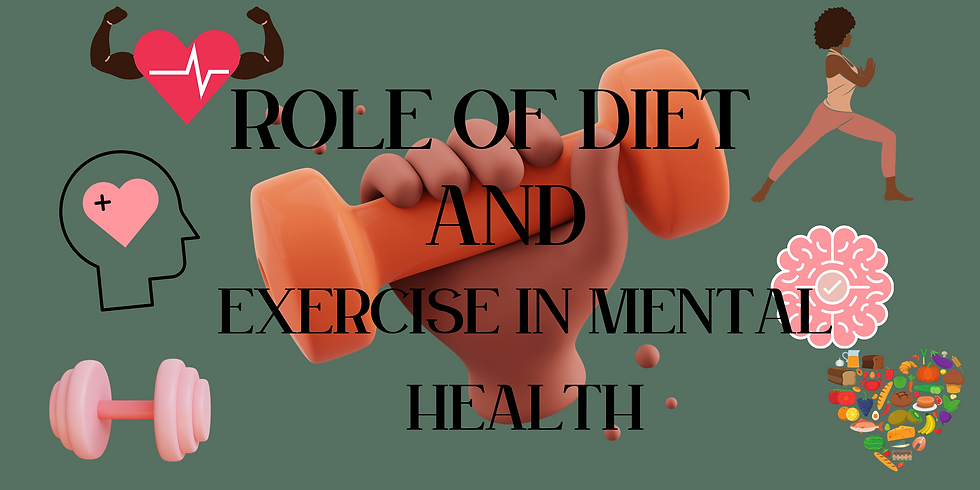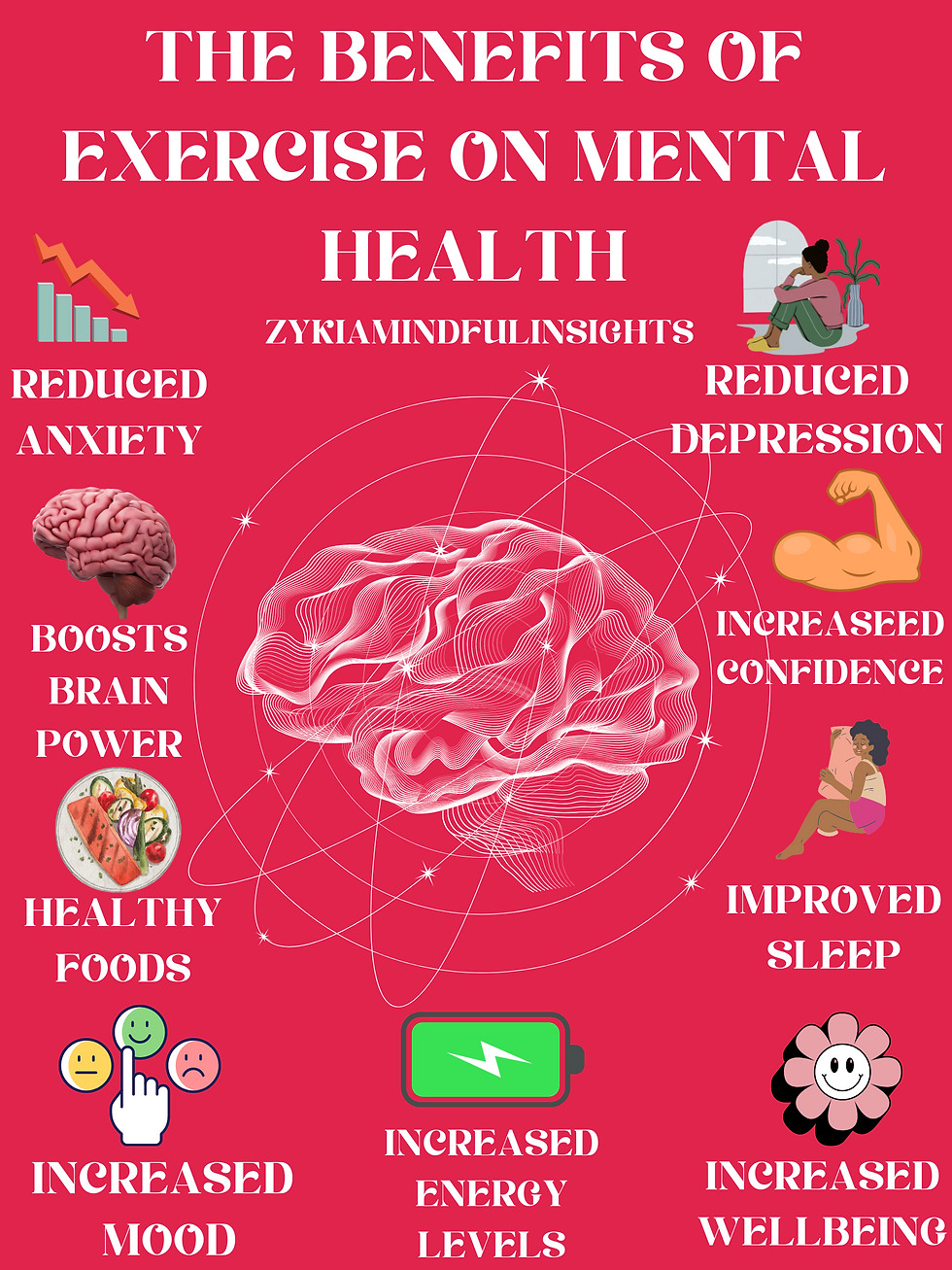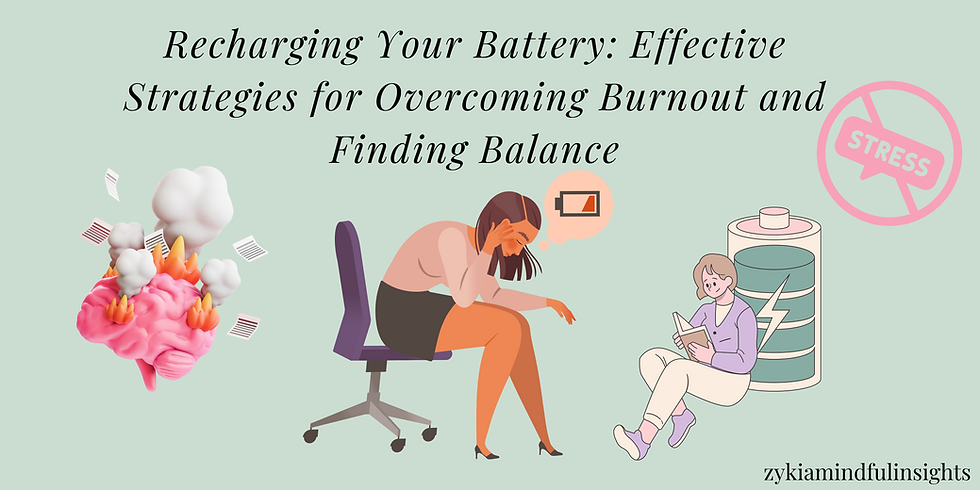Role of Diet and Exercise in Mental Health
- Zykia Hannah

- Feb 7, 2024
- 5 min read
Unlocking the profound connection between mind and body, delve into the transformative impact of diet and exercise on mental health. From fortifying resilience to uplifting moods, discover how nourishing the body and staying active create a powerful synergy for emotional well-being on our mental health journey.
Embarking on a journey toward mental well-being involves more than just introspection. It extends to the choices we make daily, especially in terms of diet and exercise. As we unravel the intricate relationship between our physical health and mental resilience, it becomes evident that the food we consume and the activities we engage in play pivotal roles in shaping our psychological landscape. From the vibrant nutrients that fuel our brains to the endorphin-boosting effects of exercise, this exploration seeks to illuminate the profound impact lifestyle choices can have on our mental health. Let's delve into the science-backed strategies that empower us to cultivate a harmonious balance between mind and body.

Before we get started, I will provide a few pointers about the Role of Diet and Exercise in Mental Health. These pointers would be good if you're looking for ways to help our with your diet and also your mental health.
Pointers about Role of Diet and Exercise in Mental Health
Nutrient-Rich Diet : A diet rich in essential nutrients, such as omega-3 fatty acids, antioxidants, and vitamins, supports brain function. These nutrients contribute to neurotransmitter production, influencing mood and cognitive processes.
Brain-Boosting Foods : Incorporating foods like fatty fish, leafy greens, whole grains, and berries can enhance cognitive function. These foods provide a diverse range of nutrients that promote mental clarity and overall brain health.
Gut-Brain Connection : The gut and brain are interconnected, and a healthy gut microbiome can positively impact mental health. Consuming probiotics and fiber-rich foods supports gut health, influencing mood-regulating neurotransmitters.
Endorphin Release through Exercise : Physical activity stimulates the release of endorphins, neurotransmitters that act as natural mod lifters. Regular exercise has been linked to reduced symptoms of anxiety and depression, promoting a more positive mental state.
Stress Reduction and Improved Sleep Exercise : Exercise helps in managing stress by reducing cortisol levels and promoting relaxation. Additionally, a balanced diet and regular physical activity contribute to better sleep quality, crucial for maintaining optimal mental health.
In our fast-paced lives, the significance of maintaining good mental-health extends beyond conventional self-care practices. The profound connection between diet and mental well-being has gained recognition, highlighting the impact of our food choices on mood and cognitive function. A nutrient-rich diet, abundant in omega-3 fatty acids, antioxidants, and vitamins, serves as a cornerstone for supporting optimal brain function. These elements contribute to the production of neurotransmitters, influencing our emotional state and cognitive processes.
Beyond the plate, our daily exercise routines play a pivotal role in nurturing mental resilience. Physical activity isn't merely about sculpting the body; it's a potent tool for enhancing mental clarity and emotional balance. Engaging in regular exercise releases endorphins, often referred to as the body's natural mood enhancers. This physiological response not only lifts our spirits but also aids in alleviating symptoms of anxiety and depression, creating a positive impact on overall mental health.
Delving deeper, the intricate link between the gut and the brain cannot be overlooked. Emerging research emphasizes the importance of a healthy gut microbiome in influencing mental health. Consuming foods rich in probiotics and fiber fosters a balanced gut environment, positively impacting neurotransmitter influencing our mood and stress response.
Furthermore, the role of a balanced lifestyle goes beyond immediate mood elevation. Exercise is a powerful stress management tool, reducing cortisol levels and promoting a sense of relaxation. In tandem with a nutritious diet, these lifestyle factors contribute to improved sleep quality, a critical component of mental well-being. As we navigate the complexities of modern life, acknowledge and actively nurturing the symbiotic relationship between diet, exercise, and mental health becomes an empowering step towards a more resilient and balanced self.
In this next section we are going to talk about some facts about the Role of Diet and Exercise in Mental Health. These are some very helpful facts that you could use for your everyday life, or to help a friend that might need some advice.

Neurotransmitter Production : Nutrient-rich diets, including omega-3 fatty acids and vitamins, support neurotransmitter production. These chemical messengers play a crucial role in regulating mood and cognitive function.
Endorphin Release : Exercise triggers the release of endorphins, hormones that act as natural mood boosters. Regular physical activity has been associated with a reduction in symptoms of anxiety and depression.
Gut-Brain Axis : A healthy gut microbiome influences mental health through the gut-brain axis. Probiotics and fiber-rich foods contribute to a balanced gut environment, impacting neurotransmitter production and stress response.
Blood Sugar Balance : Maintaining stable blood sugar levels through a balanced diet helps prevent energy crashes and mood swings. Consistent energy levels contribute to better mental focus and emotional well-being.
Brain-Boosting Nutrients : Certain foods, such as fatty fish, leafy greens, and berries, contain nutrients like omega-3 fatty acids and antioxidants that support brain health and cognitive function.
Reduced Inflammation : Diets rich in anti-inflammatory foods, such as fruits, vegetables, and whole grains, may help reduce inflammation in the body. chronic inflammation has been linked to mental health disorders.
Stress Reduction : Exercise is a potent stress management tool, helping to lower cortisol levels and promoting relaxation. Regular physical activity contributes to a more resilient response to stressors.
Improved Sleep Quality : Both diet and exercise play roles in promoting better sleep quality. Quality sleep is essential for mental health, aiding in memory consolidation, emotional regulation, and overall well-being.
Cognitive Function Enhancement : Engaging in regular physical activity has been linked to improved cognitive function, including enhanced memory, attention, and problem-solving skills.
Holistic Approach : Combining a balanced diet with regular exercise forms a holistic approach to mental health. The synergistic effects of these lifestyle factors contribute to overall emotional resilience and well-being.

Here is a few more tips about Role of Diet and Exercise in Mental Health :
Prioritize Nutrient-Rich Foods : Embrace a diet filled with nutrient-dense foods like fatty fish, leafy greens, and berries. These provide essential vitamins, minerals, and antioxidants that support brain health and contribute to positive mental well-being.
Incorporate Omega-3 Fatty Acids : Include sources of omega-3 fatty acids, such as salmon, flaxseeds, and walnuts, in your diet. These healthy fats play a crucial role in neurotransmitter function, potentially improving mood and reducing the risk of mental health issues.
Stay Hydrated : Hydration is key for overall health, including mental well-being. Ensure you're drinking enough water throughout the day, as even mild dehydration can impact cognitive function and mood.
Engage in Regular Exercise : Prioritize physical activity as a fundamental aspect of your routine. Whether it's brisk walking, jogging, or engaging in a favorite sport, regular exercise not only releases endorphins but also contributes to stress reduction and improved mental resilience.
Mindful Eating and Moderation : Practice mindful eating by paying attention to hunger and fullness cues. Avoid extremes and embrace moderation, as balanced eating habits contribute to stable blood sugar levels, fostering consistent energy and emotional balance.
"Fuel your body with nourishing foods and move with purpose; in doing so, you not only strengthen your physical health but also fortify your mental resilience and cultivate a balanced state of well-being."
In the intricate dance between mind and body, the pivotal roles of diet and exercise in nurturing mental health are undeniable. Our dietary choices, rich in essential nutrients, serve as the building blocks for optimal brain function, influencing neurotransmitter production and cognitive well-being. Simultaneously, engaging in regular exercise releases endorphins, fostering a positive mood and alleviating symptoms of anxiety and depression. Beyond immediate mood elevation, these lifestyle factors contribute to a holistic approach to stress management, promoting resilience and a balanced response to life's challenges. Recognizing the symbiotic relationship between our daily choices and mental well-being empowers us to cultivate a lifestyle that not only supports our physical health but also nurtures the intricate landscape of our mental resilience.
You have made it to the end of today's post! I hope you enjoyed reading this and have gained or learned some new information. I hope this helps someone that might need it. Feel free to leave some feed back. I really enjoyed writing today's post. This is another one of my favorited topics that I have done so far. Thank you so much for reading 🩷.
🫧Quote of the day :
"Eating well fuels our bodies. Taking care of our mental health means we sleep better and feel happier." 🩷




Comments